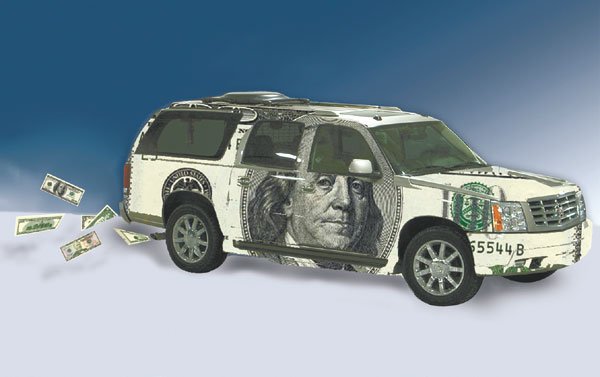It’s so confusing and, frankly, pretty boring. But it’s a
necessary evil that every driver must concern themselves with: car
insurance.
It’s so confusing and, frankly, pretty boring. But it’s a necessary evil that every driver must concern themselves with: car insurance.
Insurance company commercials promise the moon and stars and ultra savings if drivers switch to their plans, and sorting through how much to pay for what kind of coverage can make anyone’s eyes glaze with a vacant “I-have-no-clue-what-you’re-saying” stare.
The bottom line, however, is that knowing the ins and outs of car insurance can mean big savings. Drivers just need to know what to ask for.
“The best way to figure out car insurance is to sit down with a professional and figure out how to get the most coverage for your money,” said Irma Delgado, an insurance agent at Farmers Insurance Group Copeland and Delgado Insurance Office in Morgan Hill.
Some things such as where a driver lives, what kind of car they drive and how long they’ve been driving influence insurance rates at any company. But other things, such as car alarms, may be worthy of a discount at one company, but not at another.
Having a car alarm means receiving a discount, albeit a small one, with State Farm Insurance, said Jim Fosdick, an agent in Hollister, but not at Farmers Insurance.
“If you have a car alarm, is that going to prevent someone from slamming into you?” asked Delgado. “Removable face plates and car alarms don’t make a difference with this company because those things won’t keep your car from plummeting off a bridge.”
Delgado and Fosdick agree having a clean driving record-no accidents and no points on your record from tickets-is one of the most important aspects of keeping car insurance rates low.
“The California Good Driver discount is a law that says if you haven’t had an accident or tickets, you can get a 20 percent discount on each car,” Fosdick said. “Actually, you can have a ticket, but it can’t be more than one point against you.”
While the best way to keep auto insurance costs down is to maintain a good driving record, there are other ways to cut costs, according to the Insurance Information Institute.
– Shop around. Prices vary from company to company, so get at least three price quotes from different companies. Ask friends and relatives for their recommendations. Pick a company representative that takes the time to answer your questions over the phone. Check exactly what kind of coverage you’re getting for your money, Fosdick said. While one company may save you money, the coverage may be minimal.
– Compare insurance costs before buying a car. Insurance premiums are based in part on the car’s sticker price, the cost to repair it, the model’s overall safety record and the likelihood of theft. Before buying, get information with the Insurance Institute for Highway Safety at www.iihs.org. Driving an expensive car means an insurance company is responsible for paying more money than a less expensive one if the car is involved in an accident, Fosdick said.
– Ask for higher deductibles. Deductibles are what you pay before your policy kicks in. Raising a deductible from $200 to $500, for example, can reduce collision coverage costs by 15 to 30 percent. Weigh the cost/benefits of comprehensive coverage, though, because it may be better to go for lower or no deductibles, Fosdick said.
– Reduce coverage on older cars. If your car is worth less than 10 times the insurance premium, purchasing full collision and comprehensive coverage may not be cost effective. Check your car’s worth with Kelley’s Blue Book at www.kbb.com.
– Make sure your car has safety features. Anti-lock brakes, airbags and other features can earn drivers discounts, Delgado said.
– Buy homeowners and auto insurance from the same company. Many insurers will give you a break if you buy two or more types of insurance, which is the case with both Fosdick and Delgado’s companies. You may also get a reduction if you have more than one vehicle insured with the same company.
– Maintain a good credit record. Establishing a solid credit history can cut your costs. Insurers are increasingly using credit information to price auto insurance policies.
– Take advantage of low mileage discounts. Some companies offer discounts to motorists who drive a lower-than-average number of miles annually. These discounts can also apply to drivers who carpool to work.
– Ask about group insurance. Some companies offer reductions to drivers who get insurance through a group plan from their employers, from professional, business and alumni groups or other associations.
– Seek out other discounts.You may also seek a discount by taking a defensive driving course. Seniors taking a mature driver’s course through AARP or the DMV will also earn a discount, Delgado said. State Farm, Farmers and other companies offer discounts to students maintaining a B-average or better, which can mean thousands of dollars worth of savings, Fosdick said. Young people, who pay some of the highest premiums, may also earn discounts by taking defensive driving and driver education courses, he added.
Ask your insurance company what other discounts you may be eligible for.
Ask these Questions
Inquire about the following discounts when insurance shopping:
– higher deductibles
– more than one car
– no accidents in three years
– driver training courses
– defensive driving courses
– anti-theft devices
– low annual mileage
– air bags
– anti-lock brakes
– daytime running lights
– student drivers with good grades
– auto and homeowners coverage with the same company
– college students away from home
– long-time customer
– other discounts
For more information, call the National Insurance Consumer Helpline at (800) 942-4242.














